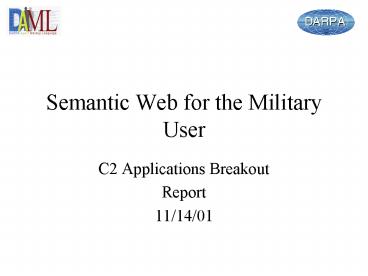Semantic Web for the Military User PowerPoint PPT Presentation
Title: Semantic Web for the Military User
1
Semantic Web for the Military User
- C2 Applications Breakout
- Report
- 11/14/01
2
C2 Apps Participants
- Mike Dean BBN
- Rob Rasch BCBL-L (Army)
- Mike Rimmer NWDC
- Mark Gorniak AFRL
- Ken Whitebread LMSC/ATL
- Frank White SSC
- Martha Kahn Global Infotek
- Hal Hultgren NWDC
- Paul Neves BBN
- Lee Lacy DRC
- Tom Martin RME
3
Objectives
- Explore Command and Control Applications for DAML
developments, both long and short term - What are ways in which we can best explore the
value of DAML for C2 functions
4
Framework Expeditionary Sensor Grid
5
C2 Applications Outbrief Framework - ESG
- Control of systems/sensors/and networks
- With auto registration, knowledge of
capabilities, can more intelligently control for
optimal or appropriate coverage for the mission
at hand for planning, and adaptation to changing
conditions. - Infrastructure Applications
- Semantic interoperability of systems, dynamic
reconfiguration with understanding at the
machine level of the implications - Sensor Applications
- Smart Sensors communicating with one-another
- E.g., unattended acoustic/IR aerial, ground, or
underwater sensor (one of potentially thousands) - Fusion, aggregation and reporting
6
Expeditionary Sensor Grid
- Objective
- Many cheap sensors, netted, fused, aggregated and
managed - Air, Ground, Maritime, not uniquely Naval, but
essential for assuring access to the litoral - Requirements at sensor, network, and system
control levels - Sensor Fusion, Sensor Management, Communications
Management, all issues requiring automotion
7
DAML in Expeditionary Sensor Grid(ESG) for Data
and Information Fusion
- ESG - A sensor grid architecture that integrates
sensors, networks, decision aids, warriors and
supporting systems into a highly adaptive
comprehensive system that operates from the
surface to space and from sea to land. - Widely varying heterogeneity, thousands of
sensors and sources - coalition, legacy and
emerging systems and sensors - Fusion will require many more operators than
practical and automation of fusion will depend on
software agents - DAML Contribution
- Referenced metadata regarding sensor
characteristics, performance and reliability
(pedigree), and decision-needs context for
multiple heterogeneous sensors/sources/systems
enabling high level automated (agent-based)
fusion.
- FY 02 ESG Enabling Experiments
- Assess DAML markup utility for enhancement of
fusion - Explore bandwidth overhead and scalability
issues.
8
DAML in Sensor Fusion
Semantic Resources
Time Series
Sensor Fusion Processor
Sensor d specification Algorithm description
C2 Fusion
Sensor c specification Algorithm description
Sensor b specification Algorithm description
Sa
Classification Confidence Localization Tracks
Event Data
Sa
Sa
Sb
Sc
Szz
Sd
Se
...
Sa
Heterogeneous Sensors
Event Time/Freq, Intensity, Shape Features,
Sensor Data
Fixed Data Structure
XML
DAML
Sensor Processing Stream using fixed structure,
XML, and DAML
9
DAML in Sensor Fusion
DATA AND INFORMATION FUSION (Client and
Services?)
Semantic Resources
Visualization, Management
Sensor c specification Pedigree Algorithm
description Unit definition Decision Context
High
Sensor b specification Pedigree Algorithm
description Unit definition Decision Context
Impacts
Sensor a specification Pedigree Algorithm
description Unit definition Decision Context
Situation
Level 3
Impact
Situations
Level 2
Situation Refinement
Event Time/Freq, Intensity, Shape Features,
Sensor Data
INFERENCE LEVEL
Object Base
?
Level 4 Resource Refinement
Level 1
Existence of object Classification Confidence Loca
lization Tracks Event Data
DAML
Object Refinement
Objects
?
Level 0
Signal Data Refinement
Low
Szz
Sc
Sd
Se
...
Sb
HUMINT
Fixed Data Structure, XML
Open Source
Time Series
Heterogeneous Sensors and Sources
Sensor Processing Stream using fixed structure,
XML, and DAML
10
By the way
- XML 10x hard code
- DAML 2x XML
- Jini/Java breakpoint
11
Recommendations/Actions
12
Communications
- For ESG, smart agent needed for dynamic
communications management to do reasoning about
the network to support the smart agent
operation, need - Comms ontology from Operational Level to Tactical
Level (see next slide) - Identify boundaries of sensor nets, etc.
13
Ontology Development
- Ontology from Operational Level (CJTF) to
tactical level (weapons on target) for supporting
modeling of sensor/ communications/ information
management needs - Benefits to ESG
- Experiment design
- System Concept Testing
- Once refined, system design, and construction
- Ties to many many other needs
- Leverage of Doctrine/TTP/Lessons Learned/Training
14
Experimentation (General)
- Experimentation (EEE)
- For both Communications and Fusion applications,
refine the CoABS Grid DAML interfaces for Utility
for - Dynamic Communications
- Sensor Management
- Sensor Fusion
15
DAML For Fusion
- EEE Experimentation
- Explore the Depth of where DAML markup makes the
most sense - Explore Jini/Java (I.e., Grid) object translation
to DAML - Research
- Assess DAML tools for the multiple layers from
the physical to the information management - Bandwidth tradeoffs, etc.
- Modeling DAML/assessing utility in the mobile
environment
16
Homeland Security
- Will you provide a wish-list of ontologies?
- Can you help with exporting data in DAML
- Ultimate goal can assess introducing DAML at
lower level in process for ultimate use in agent
applications - Nearer term
- Researchers could work with data
- Will help with developing other (ESG) sensor
related data

